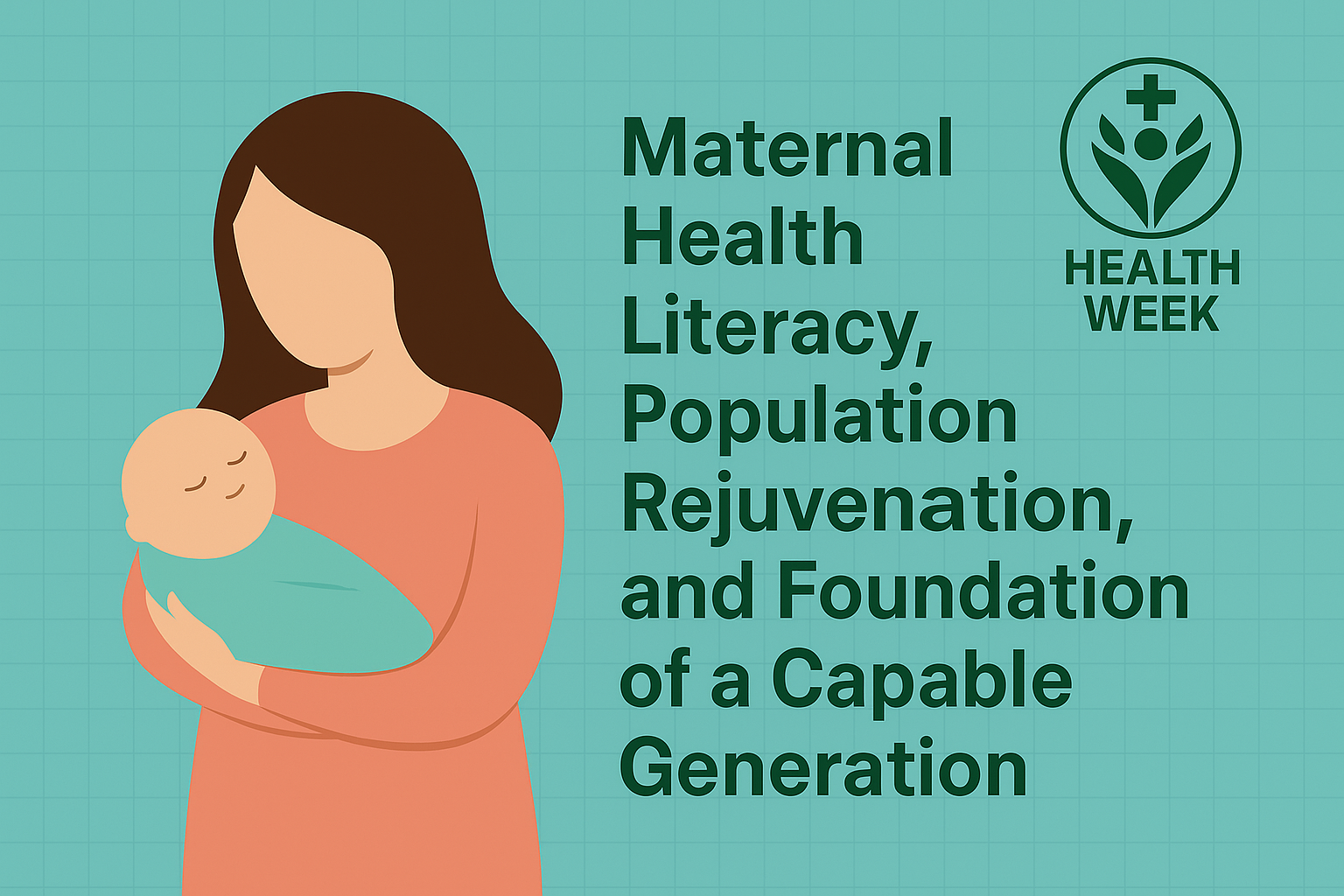Health Week, Day 3: Maternal Health Literacy, Youthful Population, and Empowered Generation

"Maternal Health Literacy, Youthful Population, and the Foundation of an Empowered Generation"
On the third day of Health Week 2025, with a focus on the pivotal role of mothers in population health and the future of our nation, the slogan “Maternal Health Literacy, Youthful Population, and the Foundation of an Empowered Generation” was chosen. This message emphasizes the essential need to enhance mothers’ health-oriented knowledge and skills as one of the most effective social and public health investments. What follows is a reflection of current scientific evidence and practical analyses in this field.
From Awareness to the Future: Why Maternal Health Literacy Is Essential
In a world where health is regarded as the cornerstone of sustainable development, maternal health literacy plays a critical role in ensuring individual, familial, and population-wide well-being. This form of literacy refers to the ability to comprehend, interpret, and apply health information to make informed and effective decisions in daily life. Mothers who possess such competencies not only experience healthier pregnancies but also lay the groundwork for nurturing a robust, capable, and forward-looking generation. In essence, health literacy serves as a bridge between maternal awareness and the empowerment of future generations.
Recent Scientific Findings on Maternal Health Literacy
Global research in recent years—particularly in 2024—has revealed that low levels of health literacy among pregnant women are linked to adverse outcomes such as preterm births, stillbirths, low birth weight, and even increased maternal mortality. These detrimental outcomes frequently arise from an inadequate understanding of necessary care, improper nutrition, misinterpretation of clinical warnings, and a lack of ability to utilize healthcare services effectively. In contrast, mothers who have access to reliable health information and can accurately discern valid from invalid sources tend to adopt healthier behaviors, confidently pursue prenatal care, and engage more effectively in treatment decision-making. Furthermore, the importance of digital health literacy has increasingly come to the fore, as the capacity to use health applications and online platforms can significantly contribute to reducing anxiety, improving mental health, and enhancing pregnancy outcomes.
Mothers as Catalysts for Future Generations: The Role of Women in Advancing Public Health
In today’s society, motherhood transcends a mere biological state; it represents a profound social and educational mandate that critically influences the health of future generations. Women must be equipped to make sound decisions not only for themselves but also for the well-being of their children and their communities. This critical goal is achievable through the promotion of health literacy. Access to evidence-based information, familiarity with health rights, informed dialogue with healthcare professionals, and the strengthening of digital literacy skills are pivotal steps in this process. Moreover, by disseminating health knowledge within their families, women can serve as key agents in raising awareness and driving social change.
When Policy Gives Meaning to Health: The Role of Decision-Makers in Advancing Health Literacy
Health policymakers and administrators must create environments where every pregnant woman can easily, safely, and equitably access health information and services. Establishing a health system founded on the concept of “health-literate organizations” is an essential step toward this goal. This involves presenting information in plain language, utilizing appropriate visual design, training healthcare workers in effective communication, and developing culturally tailored digital tools. Special consideration should be given to diverse linguistic and cultural groups, including ethnic minority women. Enhancing health literacy should not be viewed as an ancillary program, but rather as an integral component of the national strategy for maternal and child health.
Communities as Partners in Change: How Society Can Contribute on This Path
Moving toward a society with empowered mothers requires a cultural shift—a transition from a treatment-centric model to one that is proactive and educational. In this journey, families, schools, media, religious institutions, and community activists all play indispensable roles. Additionally, men need to be educated as future fathers and partners in family health. A community that internalizes and promotes health literacy will nurture a generation that is committed, motivated, and holistically healthy.
An Empowered Generation, A Brighter Future: The Benefits of Investing in Maternal Health Literacy
Investing in the enhancement of maternal health literacy is fundamentally an investment in a brighter future. This approach leads to reduced healthcare costs, lower infant mortality rates, improved quality of childbearing, reduced pregnancy-related anxiety, and ultimately, an enhancement of the physical, mental, and social well-being of families. Furthermore, children raised in an environment enriched by informed care—nurtured by empowered mothers—will be better prepared to make meaningful contributions to society. Such a strategy benefits not only individuals but also strengthens the overall framework of population health and national development.
Sources:
-
Ningrum EW, et al. (2024). Improving Maternal Health Literacy. [PMC11391996]
-
Carbone ET, et al. (2024). Maternal Health Literacy and Empowerment. [DOI]
-
International Journal of Gynecology & Obstetrics (2024). Impact of Health Literacy on Pregnancy Outcomes. [PubMed]
-
Journal of Women’s Health (2024). eHealth Literacy and Maternal Outcomes. [DOI]
-
BMC Public Health (2024). Health Literacy in Ethnic Minority Pregnant Women
-
PLOS ONE (2024). Digital and Language Barriers in Maternal Health
